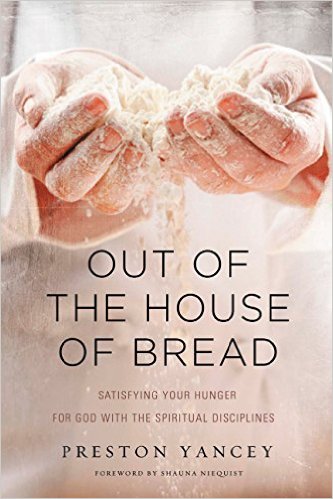Out of the House of Bread
Satisfying Your Hunger for God with the Spiritual Disciplines
by Preston Yancey
Is there a fragrance that immediately brings thoughts of worshipping God to your mind? Frankincense in the air has triggered that thought in me for many years, but after reading Preston Yancey’s Out of The House of Bread: Satisfying Your Hunger for God with the Spiritual Disciplines (Zondervan 2015), it just might be the smell of fresh-baked bread that ushers the Bread of Life to mind from now on. Yancey’s book combines the craft of making bread, one’s hunger for God, and the practice of spiritual disciplines and links them so that they take become a single, inviting entity. If you are looking for an EPIC (Experiential, Participatory, Image/sensory rich, and Connective) way to observe Lent this year, Out of the House of Bread may be the perfect book for you.
Out of the House of Bread is not simply to be read, it is designed to be experienced over the course of nine weeks. Here is the way Yancey describes the reader’s involvement:
“While there is no right way to go through this book, it’s structured assuming you will progress through it in order, giving each chapter a week. I would suggest you read a chapter, try your hand at a loaf of bread for the week, and try your hand at a spiritual discipline in tandem. The next week, try a new loaf of bread, begin a new spiritual practice.”
Yancey, who writes that he is “a lifelong Texan raised Southern Baptist who fell in love with reading saints, crossing himself, and encountering God in the Eucharist…,” is now a member of the Anglican fellowship and will soon be ordained as a priest in that church. It is as an Anglican that Yancey grew to know and practice spiritual disciplines, which he describes this way: “Spiritual disciplines are like a well-stocked chocolate drawer. You never know what you might need at a given time, but the security of knowing you have plenty on hand…when you need it is vital…Some of the disciplines in this book would be called classics, some are gently re-interpreted, some are just brushing the surface of deep wells of tradition. All I ask is that you try each. Give it a go. Give it your all. Dare to meet God in the midst of what feels ridiculous, or in the midst of what feels like you’ve been doing for years.”
Yancey is passionate about the Incarnation of Jesus, and he is desirous that every Christian understands that Jesus has been incarnated into his or her own life by means of the Holy Spirit. He doesn’t want any Christ follower to miss the truth that, “The Spirit comes and dwells. The presence of God dwells within us. We become tabernacles, the ark [of the Tabernacle] is within us in a spiritual sense as the ark was in Mama Mary, who brought Jesus into the world. We too are bringing Jesus into the world.”
For this reason Yancey says, “This book is about prayer that is bodied. Prayer that is movement. Prayer that has meat to it. Prayer that has power because the very Spirit of God dwells in you, and is polishing you up, with your participation, into the full likeness of Jesus Christ…”
The “bodied prayer” that Yancey talks about also takes its form through one’s participation in bread making. After providing several bread recipes, including a gluten free variety, Yancey likens many of the steps in bread making to spiritual disciplines, e.g., Mise en Place :The Examen; Measure and Mix: Lectio Divina; Kneading: Intercessory Prayer, and so on. Here is a paragraph from the chapter on kneading:
“Kneading is a work of wrestling, of working out something from chaos into something that has form. Intercessory prayer is like that. We are working out with God the mess of things, the chaos of being, and seeing what shape and form it could take on when we turn it over, again and again, back to God.”
Part of the pleasing texture of Out of the House of Bread is the inclusion of some of Yancey’s experiences while studying at St Andrew’s University in Scotland. In one story in the chapter called “Forming: Rootedness,” Yancey writes of the house he shared with many other students of St. Andrew’s who represented several religious denominations as well as no denomination. At the close of the spring semester each member of the cohort was present in the house and racing to meet their assignment deadlines. Early in the day Yancey, on impulse, had made a piece of unleavened bread out of some leftover flour and oil, then went to work on his paper. By the end of the day, as the sun was setting, the students realized that it was Maundy Thursday and they were not going to make it to church service on time. The group wasn’t sure how they would accomplish it, but they all agreed they wanted to acknowledge the events of Christ’s Last Supper in some way. How this acknowledgement eventually comes about is humorous, touching, and beautiful — and worth your time to read.
Out of the House of Bread: Satisfying Your Hunger for God with the Spiritual Disciplines by Preston Yancey offers stories, scriptures, prayers, and various recipes in an effort to bring Christ to the center of busy lives. It is a book that is itself a recipe: One part prayer, one part spiritual discipline, and one part baking bread. Mix them all together and you have a thoroughly enjoyable book, in Lent or at any other time of year.
thyrkas

